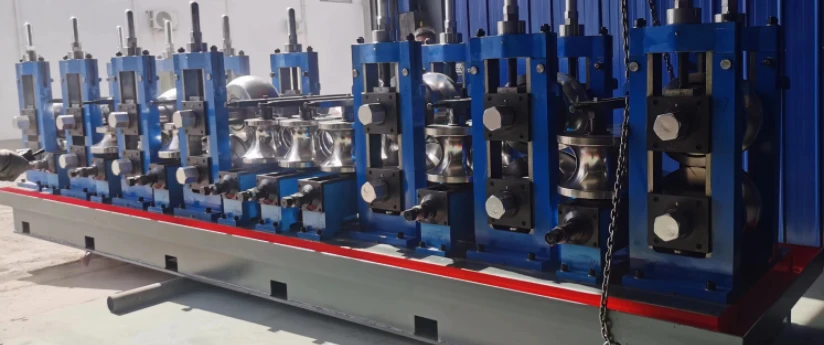electric rolling mill
The Advancements and Importance of Electric Rolling Mills in Modern Manufacturing
The manufacturing sector has undergone significant transformations over the past few decades, with the introduction of advanced technologies significantly altering production processes. Among these innovations, electric rolling mills have emerged as a pivotal component in the production of various metal products. These mills not only enhance manufacturing efficiency but also contribute to a more sustainable and eco-friendly production environment.
Electric rolling mills utilize electric power to facilitate the process of rolling metal into sheets, strips, or other forms. This technology provides a more efficient and controllable means of shaping metal compared to traditional mechanical mills. The operation of an electric rolling mill is grounded in the principles of metallurgy, where the metal is heated and shaped under high pressure as it passes between rollers. The switch from steam or gas-powered systems to electric models has resulted in significant improvements in both operational efficiency and the quality of the finished product.
One of the primary advantages of electric rolling mills is their energy efficiency. The electric motors used in these mills can deliver high levels of torque with lower energy consumption compared to their fossil-fuel-powered counterparts. This reduction in energy use not only lowers operational costs but also minimizes the overall carbon footprint of manufacturing processes. With a growing emphasis on environmental sustainability, industries are increasingly adopting electric technologies to adhere to strict regulatory standards and meet consumer demand for greener products.
In addition to energy efficiency, electric rolling mills offer superior precision and control over the rolling process. With advanced automation and digitization, these mills can achieve consistent product specifications, which is crucial for industries requiring stringent quality control, such as aerospace, automotive, and construction. Automated systems can monitor parameters like temperature, pressure, and speed in real-time, allowing for immediate adjustments during production. This level of control minimizes waste and ensures that the final products meet exact tolerances.
electric rolling mill

The introduction of electric rolling mills has also revolutionized the types of materials that can be processed. Traditional mills often struggled with high-strength alloys and advanced materials, but electric rolling mills are equipped to handle a wider variety of metals, including stainless steel and aluminum. This versatility expands the market possibilities for manufacturers, allowing them to cater to industries that demand innovative solutions and complex material properties.
Furthermore, the compact design of electric rolling mills allows for a more efficient use of floor space in manufacturing facilities. Their ability to integrate with other automated systems means manufacturers can optimize their production lines and reduce handling times, further enhancing overall productivity. As factories move toward more streamlined operations amid increasing competition, the advantages of electric rolling mills in terms of space and resource efficiency cannot be overlooked.
Despite their numerous benefits, transitioning to electric rolling mills requires careful planning and investment. Manufacturers must evaluate the upfront costs of upgrading equipment, as well as the potential return on investment through enhanced productivity and reduced operational costs. However, many companies have found that the long-term savings and competitive edge gained from implementing electric rolling mills far outweigh the initial expenditures.
As the world moves toward a more sustainable manufacturing landscape, the role of electric rolling mills will continue to grow. Innovations in electric motor technology and control systems are expected to further enhance the capabilities of these mills. As the industry embraces the principles of the Fourth Industrial Revolution, integrating artificial intelligence and the Internet of Things (IoT) with electric rolling mills may lead to unprecedented levels of efficiency and customization.
In conclusion, electric rolling mills represent a significant advancement in the field of metal manufacturing. Their efficiency, precision, and environmental benefits underscore their importance in modern production processes. As industries evolve and adapt to new technologies, electric rolling mills will undoubtedly play a crucial role in shaping the future of manufacturing, driving productivity, and fostering sustainable practices that align with global goals. Embracing these innovations will not only benefit manufacturers economically but also contribute to a greener, more sustainable future for the planet.
-
High Frequency Straight Seam Welded Pipe Production Line-BzZhou Xinghua Machinery Equipment Manufacturing Co., LTD.|Precision Welding, High EfficiencyNewsJul.30,2025
-
High Frequency Straight Seam Welded Pipe Production Line|BzZhou Xinghua|Precision Welding&EfficiencyNewsJul.30,2025
-
High Frequency Straight Seam Welded Pipe Production Line - BzZhou Xinghua|Precision Engineering&EfficiencyNewsJul.30,2025
-
High-Frequency Straight Seam Welded Pipe Production Line-BzZhou Xinghua Machinery Equipment Manufacturing Co., LTD.NewsJul.30,2025
-
High-Frequency Straight Seam Welded Pipe Production Line-BzZhou Xinghua Machinery Equipment Manufacturing Co., LTD.|Precision Manufacturing, High EfficiencyNewsJul.30,2025
-
High Frequency Straight Seam Welded Pipe Production Line-BzZhou Xinghua Machinery Equipment Manufacturing Co., LTD.|Precision Steel Pipe Manufacturing&Industrial EfficiencyNewsJul.29,2025


